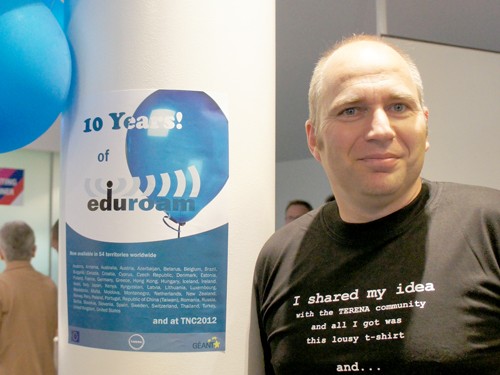
Klaas, thank you for sharing these minutes with CEDIA . Tell us about you. Where do you work? What are you doing?
I work at GÉANT, the pan-European data network for the research and education community that links National Research and Education Networks (NRENs) across Europe, enabling collaboration on projects ranging from life sciences to observation of land and arts and culture. Currently, I am responsible for Community Engagement and the Trust & Identity Portfolio.
I want to make sure that my team addresses, as well as possible, the needs of the Research and Education community, not only at the European level but at the global level.
I believe that our portfolio of services allows students and scientists to work together all over the world. Working together requires understanding and adapting to each other, which is why we not only support world-class research and education, but also contribute to a better world, as many problems arise from a lack of understanding.
Well, I have been, along with other technology and research professionals, at the forefront of federated identity solutions, and I believe they have been instrumental in transforming our industry. In addition, great support for the development of research and academia.
To be honest, because I had connection problems. I was working at the time at the Dutch NREN, SURFnet, and I was visiting universities on a daily basis where I had a lot of problems connecting to the Internet. We were using a RADIUS-based dial in service and experimenting with 802.X-based access control in student houses. The core idea was really just to combine the two for WiFi access.
It's actually millions, and that's super cool! If at least once in your career you have an idea that makes so many people happy and contributes a lot, then you can look back and be proud.
This tool is now key to the academy. What is your opinion about technological change in research?
I think we must constantly look for ways to improve research collaboration. Even more so than in the past, as research has become a truly global activity, with groups collaborating from anywhere in the world. This is reflected in the adoption of the eduGAIN service, which interconnects identity federations around the world, simplifying access to content, services and resources for the global research and education community.
My team and I are working on a number of very interesting projects, offering online learning resources, new ideas about Eduroam, applications for secure access to resources, etc. We will have many new projects for next year that we hope will continue to be applied and used by Research Networks worldwide.
I think the most important thing is to understand that a successful innovation project cannot be fully planned. What you need to do is create a climate that encourages fresh ideas and allows those with an interest in innovation to succeed. Creating the right conditions, supporting people who have ideas and being willing to take some risk, is the key.
The development of innovation projects has had a great growth in recent years, but there is still not enough support and tools for them to be carried out. It is a problem that little by little is corrected thanks to the great support that research networks like CEDIA can give to researchers and students.
I think it's impressive how far CEDIA has come. A strong NREN, like CEDIA , is key to a thriving research and innovation sector! For me it is really satisfying to see the great development in the field of research and connectivity that Ecuador has had in recent years. The CEDIA team has undoubtedly been a great pillar for this development and for this reason I want to extend my most sincere congratulations and wishes for constant growth and success.

